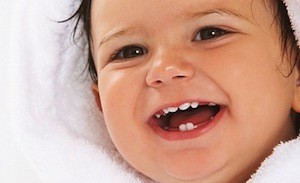Deciduous teeth, or milk teeth, are the first set of primary teeth, in humans and other diphyodont mammals. They are developed during the embryonic stage of development and appear during infancy. Milk teeth are usually lost and replaced by permanent teeth.
The milk tooth has four parts namely, incisors, canines, premolars molars. All of these are gradually replaced with a permanent counterpart. At the age of six, mixed dentition is observed where, primary teeth replaces the permanent teeth. The visible permanent teeth can cause root resorption, where the permanent teeth push on the roots of the primary teeth, which causes the roots to be dissolved by odontoclasts (as well as surrounding alveolar bone by osteoclasts) and become absorbed by the upcoming permanent teeth. This process of replacing the primary teeth with permanent teeth is called exfoliation. This may last from age six to age twelve. By age twelve there usually are only permanent teeth remaining.
Teething age of primary teeth:
• Central incisors : 6–12 months
• Lateral incisors : 9–16 months
• First molars : 13–19 months
• Canine teeth : 16–23 months
• Second molars : 22–33 months
The first baby teeth that falls out are typically the two bottom front teeth (lower central incisors) and the two top front teeth (upper central incisors), which are followed by the lateral incisors, molars and canines consecutively. Molars typically fall out between ages 9 and 12 and are replaced by permanent teeth by about age 13.
When a child starts to lose his or her baby teeth, the importance of proper dental care must be reinforced. For instance:
A child should make a habit to brush his or her teeth at least twice a day. Parent should supervise and assist the needy.
Parent should help the child floss his or her teeth daily.
Child should eat a healthy diet and limited diet between-meal snacks.
Schedule regular dental visits for your child, either with your family dentist or a pediatric dentist.
Ask the dentist about use of fluoride treatments and dental sealants to help prevent tooth decay.
With proper care, parent can help the child’s permanent teeth to last for a lifetime.
